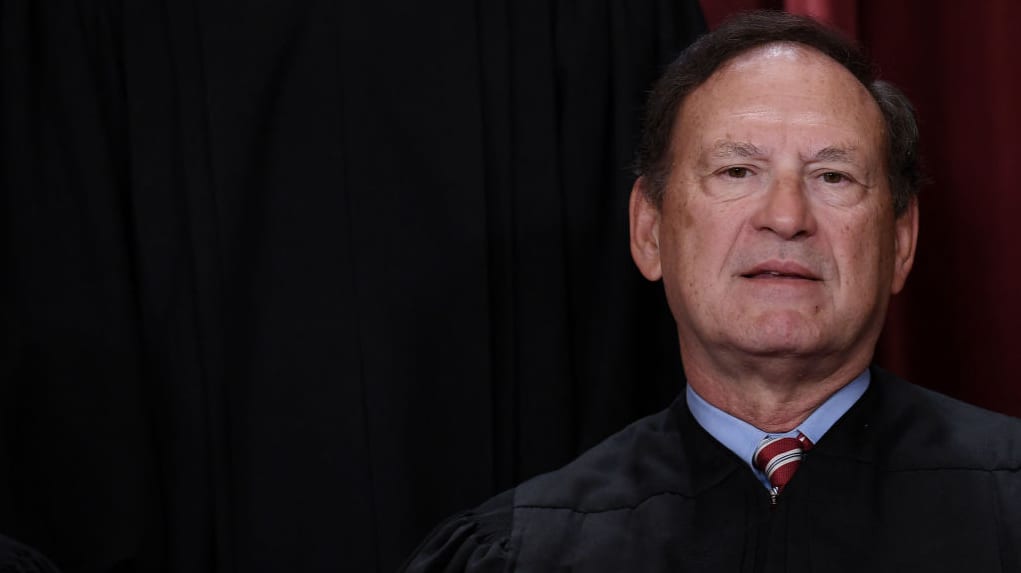Justice Alito’s tone-deaf ‘joke’ about Black children in KKK robes shows just how out of touch the court is
OPINION: These are the people deciding reproductive rights, affirmative action programs and how we treat people equally under the law.

Editor’s note: The following article is an op-ed, and the views expressed are the author’s own. Read more opinions on theGrio.
It started with a hypothetical about Santa and “It’s A Wonderful Life” asked by Justice Ketanji Brown Jackson during oral arguments Monday before the U.S. Supreme Court regarding 303 Creative v. Elenis, which involves Colorado web designer Lorie Smith, a Christian who refused to provide her custom design services for same-sex weddings on religious and free speech grounds.
Justice Jackson listened intently during arguments from Smith’s counsel, Alliance Defending Freedom’s attorney Kristen Waggoner, and asked if she could offer a hypothetical. Justice Jackson then offered an example of a mall photography business that offers a product called “Scenes with Santa.” Their policy is that only white children can be photographed with Santa. But the photographer “is willing to refer families of color to the Santa at the other end of the mall who will take anybody, and they will photograph families of color.” The justice then asked Waggoner: “Why isn’t your argument that they should be able to do that?”
It went downhill from there.
Justice Alito then jumped in trying to rebut the hypothetical proposed by Jackson, offering a hypothetical of his own that clearly favored the view of the web designer (and the view clearly of his other fellow conservative justice colleagues) and expanding Justice Jackson’s earlier hypothetical on the shopping mall Santa. Several conservative members of the Supreme Court seemed sympathetic to the arguments being made by the web designer who seeks to start a website business to celebrate weddings but does not want to work with same-sex couples.
The conservative justices all view the case through the lens of free speech and suggested that an artist or someone creating a customized product could not be forced by the government to express a message that violates her religious beliefs. Justice Neil Gorsuch noted that a businessperson’s objection would not be based on the status of the same-sex couple, but instead, the message the businessperson did not want to send. The question isn’t the “who” Gorsuch said, but the “what.”
Justice Alito, who was the author of the controversial case this summer that overturned Roe v. Wade, made a very awkward and not-so-funny analogy by picking up where Justice Jackson left off and asking if a Black individual working as a mall Santa would be compelled to take a picture with a child dressed up in a KKK outfit under the Colorado law in question.
Specifically, Alito said, “So if there’s a Black Santa at the other end of the mall and he doesn’t want to have his picture taken with a child who’s dressed up in a Ku Klux Klan outfit, that Black Santa has to do that?” Alito asked Eric Olson, Colorado’s solicitor general, who was defending the state law at issue in the case. “No, because Ku Klux Klan outfits are not protected characteristics under public accommodation laws,” Olson responded.
This prompted Justice Elena Kagan to weigh in as she asked, “And, presumably, that would be the same Ku Klux Klan outfit regardless of whether the child was Black or white or any other characteristic?” Justice Alito then cut in to say, “You do see a lot of Black children in Ku Klux Klan outfits, right? All the time. All the time.”
This is where I want to begin, because it reflects a level of stunning ignorance in the year 2022, about race, gender, and equal civil liberties, from a sitting U.S. Supreme Court justice. Alito is one of the two most conservative justices presently sitting on the nation’s high court. The other, of course, is Justice Clarence Thomas. But, this level of flippancy and ignorance on such a serious subject was disturbing not just to me; Twitter erupted after hearing the comments he made. Law professor, former Supreme Court law clerk and MSNBC legal analyst Professor Melissa Murray tweeted:
Twitter users were shocked by the tone-deafness of Alito. And it’s not just him; the rest of the court’s conservatives seem to be just as clueless on this issue. It’s simply mind-numbing to me as an attorney and as a woman of color. Reasonable, good people can debate and disagree on whether or not it is OK for a web designer or a cake maker to refuse her private services to patrons based on her religious beliefs. But, I think Justice Jackson’s analogy raises a serious point that made me, as a religious conservative and heterosexual, dig deeper into that question.
The vivid imagery of a segregated America painted by Justice Jackson in her question, where little Black children in the South could not go into a department store and see Santa or sit on his lap isn’t just a hypothetical. It was the reality in America for generations. It happened. And it did untold damage to Black children and their self-esteem and self-worth as clearly defined by the groundbreaking studies commission for the Brown v. Board of Education, the landmark case in 1954. The groundbreaking research studies revealed that Black children were deeply affected by segregation and that they viewed white skin as having more value and being superior to their own. This was the point Justice Jackson wanted us to grasp even if the children could see Black Santa and get their photo taken. Aren’t we telling them that they are different and not the same as other children who can go see white Santa and get their photo taken? The obvious answer is: Yes, we are.
Here is what I am saying: Justice Alito, like other white, privileged male members of the court, has never lived a day being treated as “different.” He has no clue. To make a flippant analogy of a Black child in KKK robes is not funny. It would never happen and was therefore nonsensical. That a sitting Supreme Court justice felt comfortable making such an appalling joke tells us how far removed they are from the reality of women, people of color and other marginalized groups.
Let it sink in that these are the people deciding reproductive rights, affirmative action programs and how we treat people equally under the law whether in marriage or how we service customers in the private sector.
Alito’s gaffe gives us yet again a window into how white cisgender men over 50 often see the world. Through an “It’s a Wonderful Life” lens. A world of whiteness, women in traditional roles, and people of color and others on the sidelines at best. Justice Jackson’s hypothetical was provocative and spot on. Whereas Justice Alito’s response to it was spotted with the stain of America’s racial past and oft-divided perspective on race and equality depending upon where you sit and who you are in America.

Sophia A. Nelson is a contributing editor for theGrio. Nelson is a TV commentator and is the author of “The Woman Code: Powerful Keys to Unlock,” “Black Women Redefined.”
TheGrio is FREE on your TV via Apple TV, Amazon Fire, Roku, and Android TV. Please download theGrio mobile apps today!


